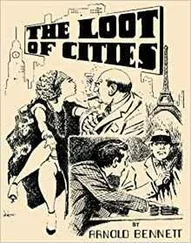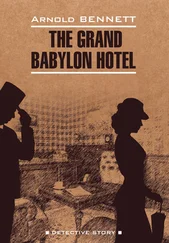"Oh! I think you might, 'm. But I can't go with you." Sex-loyalty had triumphed over a too-strict interpretation of the duty of the employed to the employer. A conspiracy had been set up.
Mrs. Arb had to step over hummocks of books in order to reach the foot of the stairs. The left-hand half of every step of the stairs was stacked with books—cheap editions of novels in paper jackets, under titles such as "Just a Girl," "Not Like Other Girls," "A Girl Alone." Weak but righteous and victorious girls crowded the stairs from top to bottom, so that Mrs. Arb could scarcely get up. The landing also was full of girls. The front-room on the first floor was, from the evidence of its furniture, a dining-room, though not used as such. The massive mahogany table was piled up with books, as also the big sideboard, the mantelpiece, various chairs. The floor was carpeted with books. Less dust than in the den below, but still a great deal. The Victorian furniture was "good"; it was furniture meant to survive revolutions and conflagrations and generations; it was everlasting furniture; it would command respect through any thickness of dust.
The back-room, with quite as large a number of books as the front-room, but even less dust, was a bedroom. The very wide bed had been neatly made. Mrs. Arb turned down the corner of the coverlet; a fairly clean pillow-slip, no sheets, only blankets! She drew open drawers in a great mahogany chest. Two of them were full of blue suits, absolutely new. In another drawer were at least a dozen quite new grey flannel shirts. A wardrobe was stuffed with books.
Coming out of the bedroom, she perceived between it and the stairs a long, narrow room. Impossible to enter this room because of books; but Mrs. Arb did the impossible, and after some excavation with her foot disclosed a bath, which was full to the brim and overflowing with books. Now Mrs. Arb was pretty well accustomed to baths; she was not aware of the extreme rarity of baths in Clerkenwell, and hence she could not adequately appreciate the heroism of a hero who, possessing such a treasure, had subdued it to the uses of mere business. Nevertheless, her astonishment and amaze were sufficiently noticeable, and she felt, disturbingly and delightfully, the thrill of surprising clandestinely the secrets of a man's intimate personal existence.
Then she caught the sound of dropping water; it was on the second-floor, in a room shaped like the bathroom, a room with two shelves, a gas-ring, and a sink. The water was dropping with a queer reverberation on to the sink from a tap above. There were a few plates, cups, saucers, jugs, saucepans, dishes; half a loaf of bread, a slice of cooked bacon; there was no milk, no butter. His kitchen and larder! One gas-ring! No fireplace! Mrs. Arb was impressed.
The other rooms on the second-floor were full of books and dust. One of them had recently been cleaned and tidied, but dozens of books still lay on the floor. She picked up a book, a large, thick volume, for no other reason than that the cover bore a representation of a bird. It was a heavy book, with many coloured pictures of birds. She thought it was quite a pretty thing to look at. By accident she noticed the price pencilled inside the front cover. £40. She was not astonished nor amazed, she was staggered. Mrs. Arb had probably not read ten books since girlhood. To her, reading was a refuge from either idleness or life. She was never idle, and she loved life. Thus she condescended towards books. That any book, least of all a picture-book of birds, could be worth £40 had not occurred to her mind. (And this one lying on the floor!) Instantly, in spite of her commonsense, she thought for a brief space of all the books in the establishment as worth £40 apiece! Before returning down the book-encumbered stairs, she paused on the top landing. Her throat was coated with the dust which she had displaced in her passage through the house. Her hands were very dirty and very cold—they shone with cold. No fire could have burnt in any of those rooms for years. She dared not touch the handrail of the staircase, even with her fingers all dirty. She paused because she was disconcerted and wanted to arrange the perplexing confusion of her thoughts. The more she reflected the better she realized how strange and powerful and ruthless a person was Mr. Earlforward. She admired, comprehended, sympathized, and yet was intimidated. The character of the man was displayed beyond any misunderstanding by the house with its revelations of his daily life; but there was no clue to it in his appearance and deportment. She was more than intimidated—she was frightened. Withal, the terror—for it amounted to terror—fascinated her. She went down gingerly, hesitating at every step… . At the bottom of the lower flight she heard, with new alarm, the bland voice of Mr. Earlforward himself. He was talking with a customer in his den.
"I'll slip out," she very faintly whispered to Elsie, who was sweeping near the stairs. Elsie nodded— like a conspirator. But at the same moment Mr. Earlforward and his customer emerged from the back room, and Mrs. Arb was trapped.
"I didn't notice you come in," said the bookseller most amiably. "What can I do for you?"
"Oh, thank you, but I only stepped across to speak to Elsie about something."
The lie, invented on the instant, succeeded perfectly. And Elsie, the honestest soul in Clerkenwell, gave it the support of her silence in the great cause of women against men.
"I'm glad to see you in here," said Mr. Earlforward gently, having dismissed the customer. " It's a bit of luck. I'd gone off for Houndsditch, but I happened to meet someone on the road, and nothing would do but I must come back with him. Come in here."
He drew her by the attraction of his small eyes into the back room. Books had been tipped off one of the chairs on to the floor. She sat down. Surely Mr. Earl-forward was the most normal being in the world, the mildest, the quietest, the easiest! But the bath, the kitchen, the blankets, the filth, the food, the £40 book, and all those new suits and new shirts! She had never even conceived such an inside of a house! She could hardly credit the evidence of her senses.
"I've wanted to see you in here, in this room," said Mr. Earlforward in a warm voice. And then no more.
She could not withstand his melting glance. She knew that their intimacy, having developed gradually through weeks, was startlingly on the point of bursting into a new phase. The sense of danger with her, as with nearly all women, was intermittent. The man was in love with her. He was in her hands. What could she not do with him? Could she not accomplish marvels?
Could she not tame monsters? And he understood his instincts; she shared them. And he was a rock of defence, shelter, safety! … The alternative: solitude, celibacy, spinsterishness, eternal self-defence, eternal misgivings about her security; horrible!
"I must be opening my shop," she said nervously.
"And I must be getting away again, too," he said, and put on his hat and began to button his overcoat. Nothing more. But at the door he added:
Maybe I'll come across and see you to-night, if it isn't intruding."
"You'll be very welcome, I'm sure," she answered, modestly smiling.
She was no better than a girl, then. She knew she had uttered the deciding word of her fate. She trembled with apprehension and felicity. He was a wonderful man and an enigma. He inspired love and dread. As the day passed her feeling for him became intense. At closing time her ecstatic heart was liquid with acquiescence. And she had, too, a bright, adventurous valour, but shot through with forebodings.
Part 2
Конец ознакомительного фрагмента.
Текст предоставлен ООО «ЛитРес».
Читать дальше












